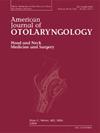The impact of primary immunodeficiency on the severity of chronic rhinosinusitis
IF 1.8
4区 医学
Q2 OTORHINOLARYNGOLOGY
引用次数: 0
Abstract
Background
Primary immunodeficiency has been associated with chronic rhinosinusitis (CRS). However, limited evidence exists on how primary immunodeficiencies affect the severity of CRS.
Objective
To assess how primary IgA and/or IgG immunodeficiency affects the severity of CRS.
Methods
Adult patients at the Beth Israel Deaconess Medical Center in Boston with IgA and/or IgG deficiency (group A) or normal IgA and IgG (group B) were queried between January 1, 2016 and December 31, 2022. Other immunodeficiencies were excluded. The groups were analyzed for prevalence of CRS based on ICD-10 codes. The groups were matched based on demographics and comorbidities. Patients with CRS were analyzed for ≥3 acute rhinosinusitis (ARS) episodes, mean lifetime ARS episodes, and mean ARS episodes per year (all with or without antibiotic treatment). Additional analyses included need for functional endoscopic sinus surgery (FESS) and mean lifetime FESS procedures based on CPT codes. A logistic regression analysis was then performed over the same parameters.
Results
A total of 346 patients had IgA and/or IgG deficiency (group A), and 11,438 patients had normal IgA and IgG (group B). CRS prevalence was higher in group A than group B (12 % vs. 5 %; p < 0.001). Group A had more patients with ≥3 ARS episodes, higher mean lifetime ARS episodes, and ARS episodes per year, though none of these findings were statistically significant. There was no difference in need for FESS or mean lifetime FESS procedures.
Conclusion
CRS prevalence is higher in patients with IgA and/or IgG deficiency, but IgA and/or IgG immunodeficiency does not predispose patients to ARS episodes or predict need for FESS.
原发性免疫缺陷对慢性鼻窦炎严重程度的影响。
背景:原发性免疫缺陷与慢性鼻窦炎(CRS)有关。然而,关于原发性免疫缺陷如何影响CRS严重程度的证据有限。目的:评估原发性IgA和/或IgG免疫缺陷对CRS严重程度的影响。方法:对2016年1月1日至2022年12月31日期间在波士顿贝斯以色列女执事医疗中心IgA和/或IgG缺乏(A组)或IgA和IgG正常(B组)的成年患者进行调查。排除其他免疫缺陷。根据ICD-10编码分析各组CRS患病率。根据人口统计学和合并症对两组进行匹配。分析CRS患者急性鼻窦炎(ARS)发作≥3次、平均终生ARS发作次数和平均每年ARS发作次数(均接受或未接受抗生素治疗)。其他分析包括功能性内窥镜鼻窦手术(FESS)的需求和基于CPT代码的平均寿命FESS程序。然后对相同的参数进行逻辑回归分析。结果:共有346例患者IgA和/或IgG缺乏(A组),11438例患者IgA和IgG正常(B组),CRS患病率A组高于B组(12% vs. 5%;结论:在IgA和/或IgG缺乏的患者中,CRS患病率较高,但IgA和/或IgG缺乏并不能使患者易发生ARS,也不能预测是否需要FESS。
本文章由计算机程序翻译,如有差异,请以英文原文为准。
求助全文
约1分钟内获得全文
求助全文
来源期刊

American Journal of Otolaryngology
医学-耳鼻喉科学
CiteScore
4.40
自引率
4.00%
发文量
378
审稿时长
41 days
期刊介绍:
Be fully informed about developments in otology, neurotology, audiology, rhinology, allergy, laryngology, speech science, bronchoesophagology, facial plastic surgery, and head and neck surgery. Featured sections include original contributions, grand rounds, current reviews, case reports and socioeconomics.
 求助内容:
求助内容: 应助结果提醒方式:
应助结果提醒方式:


